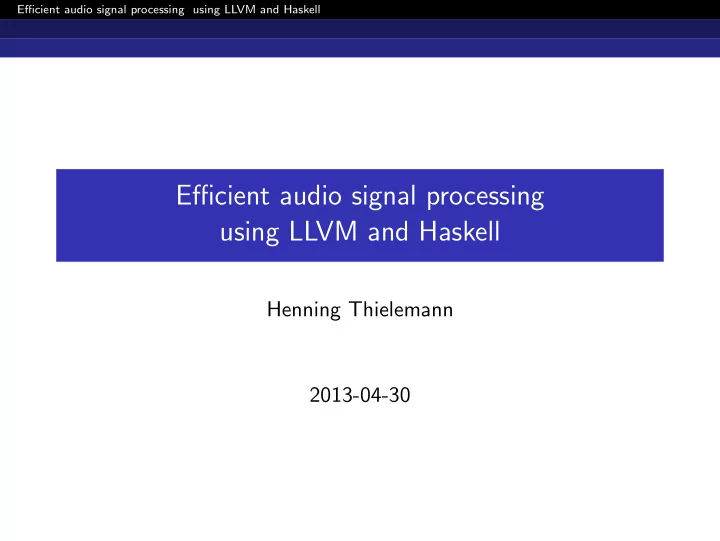

Efficient audio signal processing using LLVM and Haskell Efficient audio signal processing using LLVM and Haskell Henning Thielemann 2013-04-30
Efficient audio signal processing using LLVM and Haskell Haskell and Signal Processing Thinking in terms of signal flow diagrams means thinking functional. exponential amplifier oscillator amplify (exponential halfLife amp) (oscillator Wave.saw phase phase phase freq)
Efficient audio signal processing using LLVM and Haskell Haskell and LLVM Haskell strong type system purely functional lazy = stream processing efficiency is not primary LLVM produces efficient code, especially vector instructions weak type system Just-In-Time compilation transparent usage in Haskell adaption to available vector instructions
Efficient audio signal processing using LLVM and Haskell Embedded Domain Specific Language amplify (exponential halfLife amp) (oscillator Wave.saw phase phase phase freq) Direct interpretation: exponential and oscillator create infinite (lazy) lists of sample values amplify multiplies two lists element-wise EDSL interpretation: exponential and oscillator provide LLVM IR code for generating values successively amplify appends the code provided by exponential and oscillator and multiplies their generated values
Efficient audio signal processing using LLVM and Haskell Embedded Domain Specific Language – Problems Needed to solve more problems: sharing ( → causal arrows) feedback ( → causal arrows) cumbersome usage of arrows ( → functional interface) passing parameters to LLVM code (complicated by bug 8281) vector computing expensive computation of frequency filter parameters ( → opaque types)
Efficient audio signal processing using LLVM and Haskell Types of Vectorisation needed for Signal Processing Given: Vectors of size 2 n ideal speedup: 2 n scalar instructions → 1 vector instruction often speedup: 2 n scalar instructions → c · n vector instructions That is: Vectorisation not always optimization But: Assembling and disassembling vectors and conversion between different vector schemes also expensive Auto-vectorisation still possible?
Efficient audio signal processing using LLVM and Haskell Example: Cumulative Sum ( cumsum ) Goal: v 0 v 2 [ a , b , c , d ] [ a , a + b , a + b + c , a + b + c + d ] → Vectorisation: > 1 [ ] v 0 > a , b , c + v 0 +[ a , b , c , d ] = v 1 = [ a , a + b , b + c , c + d ] > 2 [ a + b ] v 1 > a , + v 1 +[ a , a + b , b + c , c + d ] = v 2 = [ a , a + b , a + b + c , a + b + c + d ] 4 vector instructions instead of 3 scalar instructions
Efficient audio signal processing using LLVM and Haskell Where to do vectorisation in LLVM? Different approaches: Program with vectors in Haskell, expand cumsum in Haskell (my current approach) Program with vectors in Haskell, expand cumsum in a custom LLVM pass (I’d prefer that) Program with scalars in Haskell, standard LLVM vectoriser detects cumsum (seems to be favorite of some LLVM developers)
Efficient audio signal processing using LLVM and Haskell Optimizations and JIT JIT compiles to host machine by default Optimizer does not optimize to host machine by default Result: crashs I was told, I must set target data. Why? And how, using the C interface?
Recommend
More recommend